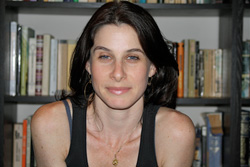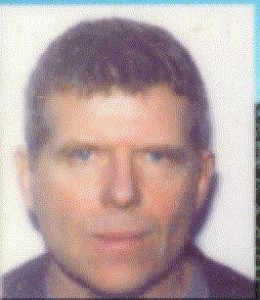 Sara Lippmann is a freelance writer and editor. Her fiction has appeared in or is forthcoming from places like BLIP (formerly Mississippi Review), Potomac Review, Our Stories,Word Riot, Slice, Storyglossia, NANO Fiction, Big Muddy and elsewhere. It has also been included in Sex Scene: An Anthology, Mamas & Papas (City Works Press), and two other anthologies from Wising Up Press. She is a graduate of the New School’s MFA program and lives in Brooklyn with her family.
Sara Lippmann is a freelance writer and editor. Her fiction has appeared in or is forthcoming from places like BLIP (formerly Mississippi Review), Potomac Review, Our Stories,Word Riot, Slice, Storyglossia, NANO Fiction, Big Muddy and elsewhere. It has also been included in Sex Scene: An Anthology, Mamas & Papas (City Works Press), and two other anthologies from Wising Up Press. She is a graduate of the New School’s MFA program and lives in Brooklyn with her family.
Q (Meg Pokrass): Do you have a mentor?
I wouldn’t say mentor, but a number of people, including some inspiring writers, have helped to whip me into shape. My 11th grade English teacher once counted the number of times I said “like” during a class presentation; in college, Meredith Steinbach took one look at me hedging around my fiction thesis and told me to sit up straight. Dani Shapiro, my advisor in grad school, instilled me with the courage to write and stick by “what is uniquely yours.” And I loved it when Jhumpa Lahiri, on the topic of submissions, told our workshop she used to drop her envelopes in the mail (when nothing was done online) and go meet a friend at some swank Boston hotel for a cocktail. She taught me to celebrate the simple fact that I’ve put myself out there, and then, to forget about the outcome. I’m taking a class with Meg Wolitzer now and she continues to press the imperative. She has these wonderful sayings, like, what’s the temperature of your story? I could listen to her all day.
More than anyone, though, it’s the members of my writing group – my keen first readers – whose feedback I trust and whose support I find invaluable.
What books do you feel closest to? What writers? A reading list would be cool.
I attended a Jewish slumber camp as a child. Every Saturday stories were read aloud to us: I.B. Singer’s “Gimpel the Fool”, Malamud’s “The Jewbird.” Subjected to the same traditional tales summer after summer, I’d pick at fallen pine needles and only half-listen but there was no denying their hold on me. This is the magic of craft: Voice, setting, dialog, character. Humor! Then I read Goodbye, Columbus – and learned, hey, characters, they don’t have to be all that likeable. Black Tickets fed me the writing bug, but what got me hooked were the modernists – Stein, Joyce, Woolf, Faulkner, etc. For a while I was so hopped up on their language and style, the way they pushed and tugged at form, I read little else. They are still important to me.
A list follows one’s personal trajectory and is incomplete in nature. That said, there are many works that continue to touch a nerve. They stay.
Short Stories
“Hills Like White Elephants” – Ernest Hemingway
“Fat” -Raymond Carver
“Perfect Day for Bananafish” – J.D. Salinger
“Quiet, Please” – Aimee Bender
“The Best of Everything” – Richard Yates
“The Hunger Artist” – Franz Kafka
“Innocence” – Harold Brodkey
“Something Nice” – Mary Gaitskill
“The Things They Carried” -Tim O’Brien
Collections: Julie Orringer’s How to Breathe Underwater, Joyce’s Dubliners
Novellas/Novels
Goodbye, Columbus – Philip Roth
As I Lay Dying – William Faulkner
Lolita – Vladimir Nabokov
Ulysses – James Joyce
The Waves – Virginia Woolf
Revolutionary Road – Richard Yates
The Wife – Meg Wolitzer
As for flash and micro fiction, forms I’ve come to really only through Fictionaut, Kathy Fish does the short better than anyone, including Jayne Anne Phillips circa Black Tickets – and Meg, you’ve cornered the flash.
What are your favorite literary websites?
The Rumpus, The Millions, The Nervous Breakdown, BLIP, Fictionaut (of course)
What are you working on now? You can talk about BLIP….
I put together an issue of BLIP with Gary Percesepe. The theme was accommodations. Some work we solicited, but most of it came over the transom, and we were thrilled to feature stories from a number of talented Fictionauters. I’m also helping out Erik Smetana at Stymie, heading up nonfiction. We’re doing a baseball issue for Spring.
Stories, hopefully a longer fiction. Making school lunches.
What suggestions do you have for when you feel creatively stuck? Do you have any unblocking secrets?
Dani Shapiro once told me that when Grace Paley was her teacher at Sarah Lawrence, Paley said she wrote in the bath. Of course, Paley didn’t mean she was soaking in the tub with dripping wet pages. What she was referring to – and what Dani passed along to me – is the space around the work. The time that you’re not physically writing, that’s all part of it, and as writers, we need to grant and honor that, too, as part of the process.
Right now, it’s enough of a trick to secure time to write, let alone carve out space around it, but I have this time each day when I walk to pick up my kids from school. Roughly twenty minutes there, and – depending on whether or not my daughter conks out in the stroller – another twenty minutes to get my son. I’ve “written” a whole bunch of stuff during these quiet, uninterrupted spells through my neighborhood.
Dreams also unlock doors. It’s musical beds in my house these days, so I’m not sleeping great but have in the past woken up with stories – or at least whole chunks – delivered on my pillow.
I also find that different media yield different results. As much as I love my laptop, I like to scribble it out, fast, on the subway or while waiting for a train. I’m often surprised by the fluidity that comes from pen and paper. Same thing when I tinker with twitter fiction. How does that 140-character box drive narrative? It’s interesting.
So, switch it up. If you’ve been staring at the screen for a while, kick it longhand. Or print out a copy of what you’re working on and see how your words play on the physical page. Try reading out loud. It’s astonishing the stuff you pick up on, the perspective you glean.
But, maybe, all you really need is a bath. A walk. That nap.
What is the most exciting thing (to you) about the online/internet literary scene/community?
Community, for one. All a writer needs is a reader, and FN delivers a widely diverse, talented and supportive readership. Here we are, reading and responding, interacting with and feeding each other’s work in a thoughtful and intimate way. If this were around ten years ago I don’t know I would have pursued that MFA. At the same time we are a large bunch, which can get overwhelming, so it’s been helpful for me to ground the virtual exchange in a real live one. I imagine many people here have done, or do, this. Julie Innis is practically my neighbor but I might never have met her it weren’t for Fictionaut. For connections like these I am so grateful.
Clearly, the proliferation online is changing how we read and what we read and the ways we relate to text. I know people say no one reads anymore but who knows what’s true. People who might not pick up a print journal are discovering fiction online. That’s for sure, and that alone is exciting.
Twitter, done right, can be so instructive. When I was in-house at a magazine – in the 90s – the PR assistant had to provide “the dailies,” a thankless and grueling task, which required her to pore through all the papers snipping and Xeroxing bits and articles and gossips of interest to the staff. These digests would be stapled and delivered on our desks by lunchtime, warm from the copier. Twitter is like that. All these smart, informed people are linking to industry articles or reviews or poems or stories I’m either too lazy or clueless to find – and with a click, it’s all right there – I’m schooled.
What can we, as writers, do to help each other the most?
It’s tough business being inside our heads all day, and I don’t know what it looks like inside yours but mine can be isolating and drafty and brutally cold, which is ironic, right, because at the end of it, what we’re really trying to do is connect. Read and be read. That is what makes us. I think we do have a responsibility as a community to care, to stay invested, to lift each other up, because, god, if we don’t do it for each other, then who?
The Fictionaut Five is our ongoing series of interviews with Fictionaut authors. Every Wednesday, Meg Pokrass asks a writer five (or more) questions. Meg is the editor-at-large for BLIP Magazine, and her stories and poems have been published widely. She blogs at http://megpokrass.com.





